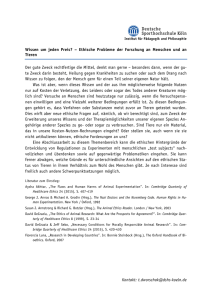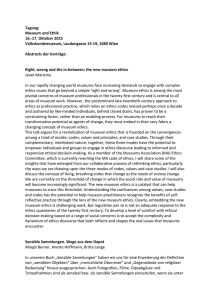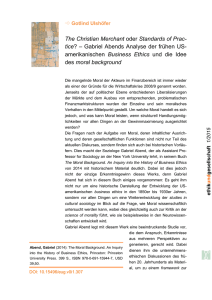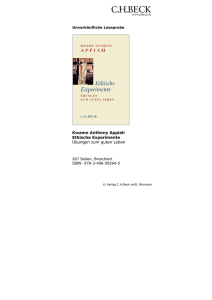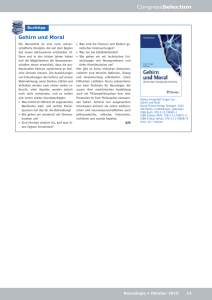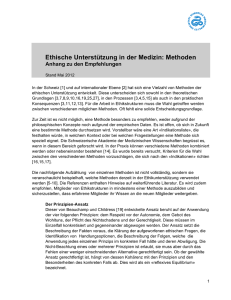Ausgabe 1/84
Werbung
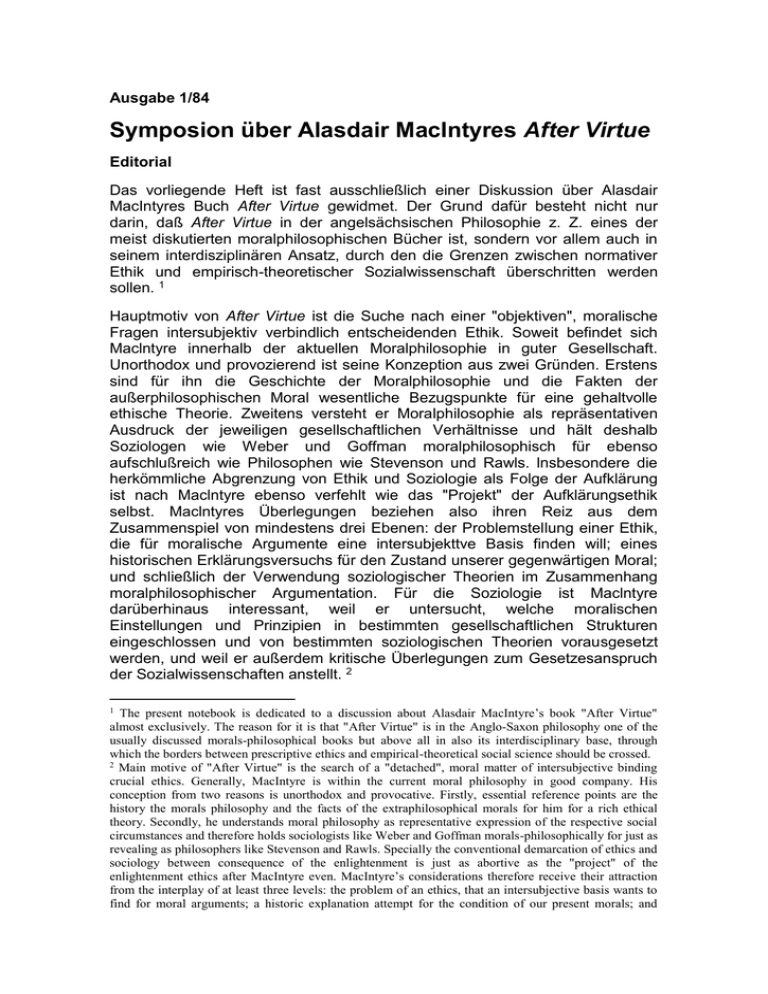
Ausgabe 1/84 Symposion über Alasdair MacIntyres After Virtue Editorial Das vorliegende Heft ist fast ausschließlich einer Diskussion über Alasdair MacIntyres Buch After Virtue gewidmet. Der Grund dafür besteht nicht nur darin, daß After Virtue in der angelsächsischen Philosophie z. Z. eines der meist diskutierten moralphilosophischen Bücher ist, sondern vor allem auch in seinem interdisziplinären Ansatz, durch den die Grenzen zwischen normativer Ethik und empirisch-theoretischer Sozialwissenschaft überschritten werden sollen. 1 Hauptmotiv von After Virtue ist die Suche nach einer "objektiven", moralische Fragen intersubjektiv verbindlich entscheidenden Ethik. Soweit befindet sich Maclntyre innerhalb der aktuellen Moralphilosophie in guter Gesellschaft. Unorthodox und provozierend ist seine Konzeption aus zwei Gründen. Erstens sind für ihn die Geschichte der Moralphilosophie und die Fakten der außerphilosophischen Moral wesentliche Bezugspunkte für eine gehaltvolle ethische Theorie. Zweitens versteht er Moralphilosophie als repräsentativen Ausdruck der jeweiligen gesellschaftlichen Verhältnisse und hält deshalb Soziologen wie Weber und Goffman moralphilosophisch für ebenso aufschlußreich wie Philosophen wie Stevenson und Rawls. lnsbesondere die herkömmliche Abgrenzung von Ethik und Soziologie als Folge der Aufklärung ist nach Maclntyre ebenso verfehlt wie das "Projekt" der Aufklärungsethik selbst. Maclntyres Überlegungen beziehen also ihren Reiz aus dem Zusammenspiel von mindestens drei Ebenen: der Problemstellung einer Ethik, die für moralische Argumente eine intersubjekttve Basis finden will; eines historischen Erklärungsversuchs für den Zustand unserer gegenwärtigen Moral; und schließlich der Verwendung soziologischer Theorien im Zusammenhang moralphilosophischer Argumentation. Für die Soziologie ist Maclntyre darüberhinaus interessant, weil er untersucht, welche moralischen Einstellungen und Prinzipien in bestimmten gesellschaftlichen Strukturen eingeschlossen und von bestimmten soziologischen Theorien vorausgesetzt werden, und weil er außerdem kritische Überlegungen zum Gesetzesanspruch der Sozialwissenschaften anstellt. 2 The present notebook is dedicated to a discussion about Alasdair MacIntyre’s book "After Virtue" almost exclusively. The reason for it is that "After Virtue" is in the Anglo-Saxon philosophy one of the usually discussed morals-philosophical books but above all in also its interdisciplinary base, through which the borders between prescriptive ethics and empirical-theoretical social science should be crossed. 2 Main motive of "After Virtue" is the search of a "detached", moral matter of intersubjective binding crucial ethics. Generally, MacIntyre is within the current moral philosophy in good company. His conception from two reasons is unorthodox and provocative. Firstly, essential reference points are the history the morals philosophy and the facts of the extraphilosophical morals for him for a rich ethical theory. Secondly, he understands moral philosophy as representative expression of the respective social circumstances and therefore holds sociologists like Weber and Goffman morals-philosophically for just as revealing as philosophers like Stevenson and Rawls. Specially the conventional demarcation of ethics and sociology between consequence of the enlightenment is just as abortive as the "project" of the enlightenment ethics after MacIntyre even. MacIntyre’s considerations therefore receive their attraction from the interplay of at least three levels: the problem of an ethics, that an intersubjective basis wants to find for moral arguments; a historic explanation attempt for the condition of our present morals; and 1 Maclntyres Argumentationsweise in After Virtue ist nicht analytisch, sondern historisch, obwohl auf der letzten, bislang nur skizzierten Stufe - einer von Aristoteles inspirierten Tugendethik - analytische Mittel verwendet werden. Drei geschichtliche Abschnitte spielen eine besondere Rolle: Aristoteles, die Aufklärungsethik und die analytische Ethik des 20. Jahrhunderts. Maclntyre will zeigen, wie die Aufklärungsethik aus einer verstümmelten aristotelischen Tradition heraus zugleich entstanden und auf ein uneinlösbares Programm festgelegt worden ist. Die analytische Ethik von Moore bis Hare und Rawls ist ihrerseits nur Folge und Erneuerung derselben Problemsituation, aus der bereits die Klassiker der Aufklärung keinen Ausweg weisen konnten. Symptom dieser Unfähigkeit, die verbliebenen Bruchstücke der aristotelischen Tradition neu zusammenzufügen, ist mangelnder moralischer Konsens: im moralischen Bewußtsein des Alltags, unter den politischen Gruppen und Parteien, und natürlich innerhalb der Moralphilosophie selbst. Das Projekt der Aufklärungsethik ist gescheitert, weil es keine moralischen Mittel gefunden hat, die freigesetzten Interessen autonom gewordener Individuen wieder miteinander zu harmonisieren. Aufgrund des historischen Bruchs, den die Aufklärungsethik gerissen hat, gibt es keine andere Alternative zu Nietzsches Antimoralismus als die Rückkehr zu einem Zustand vor diesem Bruch und damit zur aristotelischen Tradition. In welchem Sinn diese Rückkehr unseren veränderten sozialen, und damit auch psychischen und moralischen Bedingungen gerecht werden kann und wie sie genauer beschaffen sein soll, hat Maclntyre in After Virtue nur umrissen, immerhin aber genügend verdeutlicht, um eine ausführliche Grundsatz- und Einzelkritik auszulösen, zu der im vorliegenden Heft, auch zu anderen Teilen von Mac Intyres Argumentation, neue hinzukommt. Das nächste Heft wird diese Diskussion durch Aufsätze von Kai Nielsen und Gerald Doppelt, sowie eine Replik von Alasdair Maclntyre fortsetzen. 3 finally the application of sociological theories in the context of moral-philosophical argument. For the sociology, MacIntyre is interesting over it because he examines, which moral attitudes and principles are included in certain social structures and are presupposed by certain sociological theories, and because he employs furthermore critical considerations to the law claim of the social sciences. 3 MacIntyre’s argument manner in After Virtue is not analytic but historic, although analytic means are spent on the last, up to now only sketched step - a virtue ethics inspired by Aristotle -. Three historical sections play a special role: Aristotle, the enlightenment ethics and the analytic ethics of the 20th Century. MacIntyre wants to show, originated out like the enlightenment ethics from a mutilated Aristotelian tradition at the same time and on an uneinlösbares program was fixed. The analytic ethics of bog until Hare and Rawls is in turn only consequence and renewal of the same problem situation, from which already the classics of the enlightenment could not expel any way out. Symptom of this incompetence of linking the remained fragments of the Aristotelian tradition again is lacking moral consensus: in the moral knowledge of the everyday life, under the political groups and parties, and of course even within the moral philosophy. The project of the enlightenment ethics failed because it didn't find any moral means, the set free interests of autonomously become individuals, to harmonize again together. On the basis of the historic break, that the enlightenment ethics tore, there is not any other alternative to Nietzsche's Antimoralismus as the return to a condition before this break and with it to the Aristotelian tradition. This return in which sense our changed social, and with it also psychic and moral conditions just can become and how it should be obtained more exactly, MacIntyre only outlined in After Virtue, clarifies sufficiently after all, however, in order to cause a detailed principle and separate criticism, to which arrives new in the present notebook, also to other sharing of MacIntyre’s argument. The next notebook becomes this discussion through essays of Kay Nielsen and Gerald Doppelt, as well as a reply of Alasdair Maclntyre continues.
